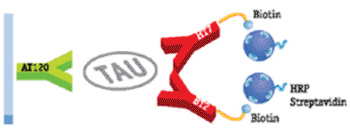Alzheimer’s Markers Predict Start of Mental Decline
By LabMedica International staff writers
Posted on 30 May 2013
Biomarkers for Alzheimer’s disease have been identified that could potentially predict which patients will develop the disorder later in life.Posted on 30 May 2013
The ability of molecular biomarkers for Alzheimer’s disease (AD), including amyloid imaging and cerebrospinal fluid (CSF) biomarkers to predict when cognitive impairment will occur among cognitively normal adults has been investigated.

Image: Schematics of INNOTEST (Picture courtesy of Innogenetics).
Scientists at Washington University School of Medicine (St. Louis, MO, USA) studied and measured the levels of the biomarkers in a total of 201 individual volunteers aged 45 to 89 years who met all the inclusion criteria. On average, the data available on study participants spanned four years, with the longest recorded over 7.5 years. The CSF biomarkers included Ab42, tau, ptau181, tau/Ab42, ptau181/Ab42. Participants with amyloid imaging and CSF collection within one year of a clinical assessment indicating normal cognition were eligible.
Levels of Ab42, total tau, and ptau181 were measured using an enzyme-linked immunoassay, (ELISA) called INNOTEST (Innogenetics; Ghent, Belgium), which has a lowest detection limit of 60 pg/mL, and the standards range is 75–1,200 pg/mL. The scientists found that all of the markers were equally good at identifying subjects who were likely to develop cognitive problems and at predicting how soon they would become noticeably impaired. They then paired the biomarkers data with demographic information, testing to see if sex, age, race, education, and other factors could improve their predictions.
Abnormal levels of all biomarkers were associated with faster time to cognitive impairment, and some participants with abnormal biomarker levels remained cognitively normal for up to 6.6 years. No differences in predictive value were found between the individual biomarkers nor did they find differences between the expanded biomarker models. Each expanded model better predicted incident cognitive impairment than the model containing the biomarker alone.
Catherine Roe, PhD, research assistant professor of neurology, and lead author, said, “We wanted to see if one marker was better than the other in predicting which of our participants would get cognitive impairment and when they would get it. We found no differences in the accuracy of the biomarkers. We can better predict future cognitive impairment when we combine biomarkers with patient characteristics. Knowing how accurate biomarkers are is important if we are going to someday be able to treat Alzheimer’s before symptoms and slow or prevent the disease.” The study was published on April 10, 2013, in the journal Neurology.
Related Links:
Washington University School of Medicine
Innogenetics













